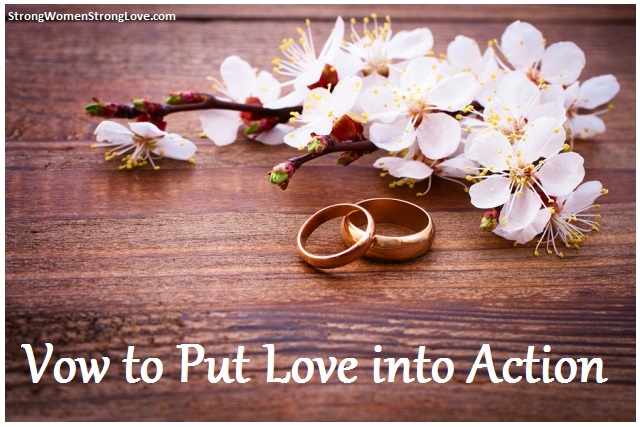by Strong Women Strong Love | Sep 30, 2015 | Passionate Partnership |

Do you ever wish you could fall deeper in love with your husband, recapturing that intense closeness that you had at the beginning? The most-talked-about relationship story of the year may point the way to doing just that.
You may have already seen this in your social media feeds, but here’s a quick recap. Researchers Arthur and Elaine Aron — who are married themselves — have spent almost 50 years studying love.
For a 1997 study, the Arons wanted to find out if they could create conditions in the lab that would make two strangers become emotionally close, perhaps even fall in love, in a very short period of time. They developed a list of 36 questions for the two people to discuss. Here’s a sampling:
- Given the choice of anyone in the world, whom would you want as a dinner guest?
- What would constitute a “perfect” day for you?
- Before making a phone call, do you ever rehearse what you’re going to say? Why?
- What is your most terrible memory?
- What is the greatest accomplishment of your life?
Inevitably, within the hour, respondents said they felt unusually close to the person they were paired with for the experiment.
Although they’ve been around for a while, the 36 questions didn’t capture the popular imagination until this year, when they became the subject of a Modern Love column in the New York Times.
The column’s author, Mandy Len Catron, and an acquaintance experimented with asking each other the questions and with another aspect of the Aron’s research designed to increase intimacy: staring into each other’s eyes for four minutes.
And, yes, they fell in love.
Catron writes:
I’ve begun to think love is a more pliable thing than we make it out to be. Arthur Aron’s study taught me that it’s possible — simple, even — to generate trust and intimacy, the feelings love needs to thrive.
Of course, there’s something deeply romantic about the idea that these questions can induce two people to fall in love. But I think it’s just as romantic to consider how they might also rekindle intimacy and trust between long-term partners.
We all know how our busy daily lives can erode those feelings between partners. The closeness with your husband can easily get lost in the stress of household tasks, taking care of kids, and managing work. It can feel impossible to get intimacy back, but Aron’s studies give us at least two clear strategies to try:
- Set aside some with your spouse to explore the 36 questions. The full list of questions is online at the New York Times website, or try out the Times’ app with the questions by visiting nytimes.com/36q with your mobile device. You may be surprised at what you learn about that husband you think you know so well!
- After you’re done with the questions, don’t forget the part about staring into each other’s eyes for four minutes. Yes, it may feel uncomfortable, but do it anyway. What kind of feelings does eye contact stir up for you?
These two exercises are incredibly powerful because there is nothing so flattering and moving as having another person genuinely notice us, want to know who we really are, and listen with true curiosity. We have a deep need to be seen, especially by those we love.
I’d love to hear about your experiences using the 36 questions. Did they spark intimacy with your spouse all over again? Share what happened by leaving a comment here or on the Strong Women, Strong Love Facebook page.
by Strong Women Strong Love | Sep 27, 2015 | Passionate Partnership, Promotions |
FREE REPORT: 10 Easy Ways to Get Him to Listen! Do you wish you could get your husband to listen without him getting so defensive? “10 Easy Ways to Get Him to Listen” gives you the exact phrases that will get his attention and make him actually enjoy talking to you. Subscribe to our mailing list today!

by Strong Women Strong Love | Sep 12, 2015 | Passionate Partnership, Quotes |

Each of us secretly and desperately yearns to be “met”—to be recognized in our uniqueness, our fullness, and our vulnerability. We yearn to be genuinely valued by others as who we are, even that we are.
~Dr. Richard Hycner
by Strong Women Strong Love | Aug 3, 2015 | Passionate Partnership |

Has it been awhile for you and your husband?
A really, really long while?
If the sex has gone out of your marriage, you may feel very alone. But trust me — you’re not. Did you know that “sexless marriage” is the most Googled phrase about sex and marriage? Some experts estimate that 15-20% of marriages can be classified as “sexless” because the frequency of sex is less than 10 times per year. Even if that number doesn’t fit your relationship exactly, you may still feel that your sex life is much less satisfying than it used to be.
The truth is that there’s no magic “sex quota” out there. How often you have sex is up to you and your husband. It’s about finding the frequency that meets both of your needs. If one of does not want sex very much and the other is feeling upset because they want more, then it’s important to figure out what’s going on and address it.
Let’s take at a look at a few reasons why you may be in a “sex slump.” Do any of these situations fit your marriage?
1. Bad timing. You just had a baby. One of you has been working really long hours. The stress level has been sky-high. You’re barely getting enough sleep to get by. Life happens and sometimes sex is put on the back burner for a while. Sexuality is not all about sexual intercourse, but from a physical standpoint, the less you have sex, the less you actually feel like having sex. Continue to be genuinely affectionate with your spouse no matter what, and don’t forget to bring the physical connection back into the picture as soon as you can.
2. No time alone. You may not be having sex simply because you are not spending enough private time together. This is a very common situation with couples who have small children who may be in and out of their parents’ bedroom at all hours of the night. It’s easy for the rest of your life to crowd out your sex life, so you have to make it a priority to keep the two of you in the picture. Plan dates, even if they are in your own house after the kids go to sleep. And let yourself get creative about the times or places you might indulge in a quickie.
3. Emotional roadblocks. Sometimes resentments, criticism, blame, or other emotional negativity can squash the desire to be sexually intimate. It’s truly hard to feel sexual desire toward someone who has hurt your feelings or is neglecting you. It’s important to try to clear the emotional air to get the sexual connection going again. If you continue to let the negativity mount, it can be a slippery slope. First the sexual connection goes, and then the emotional connection starts to unravel if you’re not careful. If you feel like negativity has already flooded your relationship and you’re truly stuck, don’t hesitate to get some counseling to help you find the path back to each other.
4. Physical causes. Fatigue, hormonal changes, chronic health problems, medications, and normal aging are some of the physical factors that affect your sexual relationship. Check with your physician for help in dealing with any physical cause that may be affecting the physical intimacy in your relationship. It’s helpful to remember that sexuality doesn’t just mean intercourse. Expand your definition of sex to include lingering touch, intimate play, oral sex, flirting, kissing, hugging,and even intense eye contact. Staying connected in these ways can help meet your needs while you work on improving the other aspects of your sex life.
5. Boredom. After many years of being together, you may have become too predictable to each other. Perhaps, sex has become routine and uninspiring. Sex is always at the same time, with the lights out, in the same position…very mechanical. The solution may be as simple as introducing some novelty and variety into your relationship. Get creative, and find some ways to spice up your love life.
A sexless marriage becomes dangerous when it isn’t meeting both of your needs or it isn’t based on what you both want. In other words, if one of you declares, “That’s it, we’re done with sex!” without talking about it with the other person, your marriage enters risky territory. It can be especially harmful if one of you is not a big talker and mainly shares how you feel about your partner through the sexual connection. Couples in this situation may also benefit from some outside help with their marriage.
It’s hard to talk about, or even acknowledge to ourselves sometimes, the realities of sexless marriage. I hope it helps to know that other couples experience this, too, and that with some patience, the passion and connection in your relationship can often be restored.
by Strong Women Strong Love | Jul 1, 2015 | Passionate Partnership |

No, that’s not a typo in the title!
In the U.S., we’re about to observe Independence Day. Maybe it’s the story of our nation’s founding that makes independence such a cherished part of our identity. Think about all the ways we idealize it in our culture: Success stories about people who pulled themselves up by their own bootstraps. Movie heroes who never “play by the rules.” Songs about women who don’t depend on a man.
Of course, it’s great to be strong and capable. But if we concentrate only on independence, we’re overlooking a vital truth about ourselves: Human beings are actually hardwired for interdependence. We need connection with others. Studies have even found that when children don’t receive connection and nurturing, “the wiring of the brain goes awry.”
Even as science affirms that we are meant to rely on each other, the value we place on independence is so strong that we might feel shame when we can’t do everything on our own. For example, it’s not uncommon for first-year college students to feel like failures because being on their own is much harder than they ever imagined.
It’s OK to Need Each Other
Our ideals about independence also affect our marriages. Admitting that you need the other person can be scary! Marriage is a dance of closeness and separation. Either extreme hurts your relationship. Clinging to your husband or constantly needing his validation approval isn’t healthy. But neither is constantly doing your own thing or never working as a team with your husband.
The balance of dependence and independence changes throughout your relationship. There will be times when you lean heavily on him, and times when he leans heavily on you. And there will also be times when both of you are so focused on other demands or interests (going back to school, caring for a parent, etc.) that you’ll have to make extra efforts to stay connected.
Being flexible enough to move from independence to dependence based on your needs is what strengthens your true partnership in life. So, as July Fourth rolls around, celebrate our country’s independence and celebrate your own. But don’t forget to also celebrate the strength we show when we need each other — the strength of closeness, commitment and true connection.
by Strong Women Strong Love | Jun 1, 2015 | Passionate Partnership |

June is wedding season. At ceremonies this month, couples will be speaking vows from the traditional to the deeply personal.
If there’s one promise I could have every couple place in their wedding vows (and honor over time), though, it would be this: Don’t just say “I love you.” Show it.
Saying “I love you” doesn’t guarantee that the other person feels loved. What carries a stronger message: the rushed “I love you” that you mumble as the two of you leave for work, or the fact that in the preceding conversation you weren’t listening or you rolled your eyes at something your husband said?
To feel loved, we need to feel safe and cherished. We need to believe that our spouse sees who we actually are — in all of our strengths, weaknesses and quirks — and accepts us. If we say all the right words but don’t back those words up with actions, the message doesn’t come through.
Need ideas for some actions that demonstrate love? This list is based on the five parts of my Powerful Program for Marriage Success.
- Cultivate Your Personal Power. Identify your needs and take responsibility for getting them met. This means taking care of yourself and making time for your own friends, hobbies, and interests. Encourage your partner to do the same. You both need to nurture yourselves so that you can be strong partners in the relationship.
- Eliminate any Poisonous Patterns that make the climate of your relationship negative. Stop hurting each other by doing things like criticizing, shaming, or casting blame. Even withholding affection, micromanaging your spouse, or getting overly wrapped up in your own world can cause emotional pain. Remember that if your hurt your partner, you are also hurting the relationship.
- Inspire a Passionate Partnership by creating an atmosphere that strengthens friendship and romance. This doesn’t mean you must have candlelit dinners every night. Lots of little actions can keep passion alive: Make eye contact. Show affection. Do something to grow together, like taking a class on a subject that interests you both. Be curious about each other. Always start with the assumption that your husband loves you, needs you, and wants the marriage to work as much as you do.
- Resist the Persistent Pressures that place all marriages at risk. All of us are under more stress than ever. What actions can you take to reduce stress in your lives — to ease up the pressure on yourself, and on your partner? When stress levels are high, fear gets triggered, leading most people to (1) assume the worst about their partner and (2) miss what’s positive about him–a double whammy! You are also much more likely to overreact to anything your partner does. Dialing down the level of stress is one of the most effective ways to move from a state of fear to a state of love.
- Protect Your Principal Priorities. One of the most powerful things you can do to show love is acting in ways that show you value your marriage. That means working together to create a life that prioritizes your relationship. You may consider moving into less demanding jobs, directing your energy toward your shared hopes and dreams, or turning down yet another volunteer obligation so you can carve out some more couple time.
Check out the previous blog post, 100 Powerful Ways to Make Your Love Stronger, for many, many more ideas about how to clearly demonstrate your love.
Above all, the most loving action is to consistently choose loving your partner over submitting to your worst fears about him or your relationship. The strongest marriages emerge from each person repeatedly choosing to believe in their relationship. Whatever you said in your original marriage vows, and however long you’ve been married, it’s never too late to be more loving!







